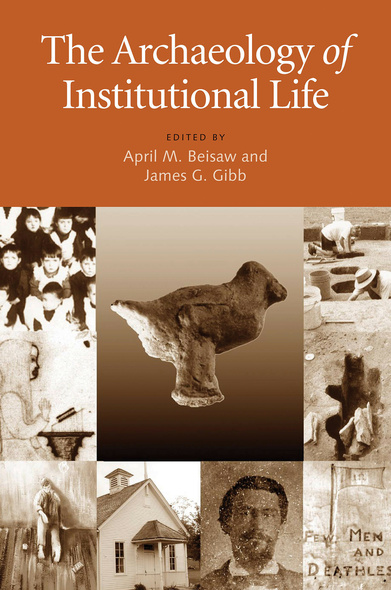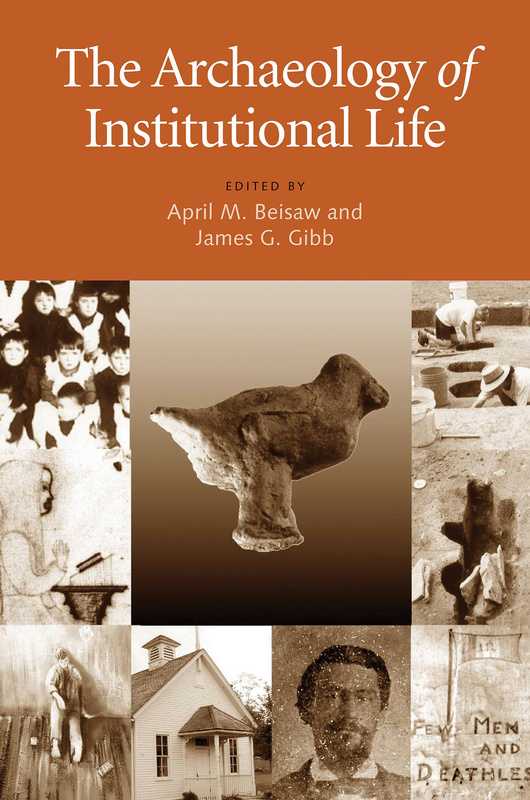The Archaeology of Institutional Life
Edited by April M. Beisaw and James G. Gibb
University of Alabama Press
A landmark work that will instigate vigorous and wide-ranging discussions on institutions in Western life, and the power of material culture to both enforce and negate cultural norms
Institutions pervade social life. They express community goals and values by defining the limits of socially acceptable behavior. Institutions are often vested with the resources, authority, and power to enforce the orthodoxy of their time. But institutions are also arenas in which both orthodoxies and authority can be contested. Between power and opposition lies the individual experience of the institutionalized. Whether in a boarding school, hospital, prison, almshouse, commune, or asylum, their experiences can reflect the positive impact of an institution or its greatest failings. This interplay of orthodoxy, authority, opposition, and individual experience are all expressed in the materiality of institutions and are eminently subject to archaeological investigation.
A few archaeological and historical publications, in widely scattered venues, have examined individual institutional sites. Each work focused on the development of a specific establishment within its narrowly defined historical context; e.g., a fort and its role in a particular war, a schoolhouse viewed in terms of the educational history of its region, an asylum or prison seen as an expression of the prevailing attitudes toward the mentally ill and sociopaths. In contrast, this volume brings together twelve contributors whose research on a broad range of social institutions taken in tandem now illuminates the experience of these institutions. Rather than a culmination of research on institutions, it is a landmark work that will instigate vigorous and wide-ranging discussions on institutions in Western life, and the power of material culture to both enforce and negate cultural norms.
Institutions pervade social life. They express community goals and values by defining the limits of socially acceptable behavior. Institutions are often vested with the resources, authority, and power to enforce the orthodoxy of their time. But institutions are also arenas in which both orthodoxies and authority can be contested. Between power and opposition lies the individual experience of the institutionalized. Whether in a boarding school, hospital, prison, almshouse, commune, or asylum, their experiences can reflect the positive impact of an institution or its greatest failings. This interplay of orthodoxy, authority, opposition, and individual experience are all expressed in the materiality of institutions and are eminently subject to archaeological investigation.
A few archaeological and historical publications, in widely scattered venues, have examined individual institutional sites. Each work focused on the development of a specific establishment within its narrowly defined historical context; e.g., a fort and its role in a particular war, a schoolhouse viewed in terms of the educational history of its region, an asylum or prison seen as an expression of the prevailing attitudes toward the mentally ill and sociopaths. In contrast, this volume brings together twelve contributors whose research on a broad range of social institutions taken in tandem now illuminates the experience of these institutions. Rather than a culmination of research on institutions, it is a landmark work that will instigate vigorous and wide-ranging discussions on institutions in Western life, and the power of material culture to both enforce and negate cultural norms.
In understanding institutions themselves, archaeologists must engage the shifting and variable understanding of the relations in capitalistic societies because even 'minor' institutions, in many ways, reflect power relations that have been variously interpreted. For professional archaeologists and certainly for college and university libraries with graduate and undergraduate programs; the general public also will find much of interest, but also much that is stiff going. Summing Up: Recommended. All academic levels/libraries.’
—CHOICE
‘Addressing a long-neglected facet of the archaeology of our modern world—our institutions—this volume reveals the interesting and insightful past of a class of sites that are deeply and inextricably tied to a core aspect of modernity.’
—Jamie C. Brandon, Arkansas Archeological Survey
This volume highlights the use of interdisciplinary approaches and multiple lines of evidence as crucial to understanding the material culture of institutions and the relations of power that they embody. Institutions embody a worldview and the lives of their residents, staff, and community observers are influenced and constrained by the ideology which fashioned it. Researchers of any discipline who share an interest in power relations, childhood, gender studies, community relations, and institutional history will all find food for thought within The Archaeology of Institutional Life.’
—Journal of Middle Atlantic Archaeology
April M. Beisaw is Research Associate, Department of Anthropology, Binghamton University.
James G. Gibb is an archaeological consultant, Annapolis, Maryland.





